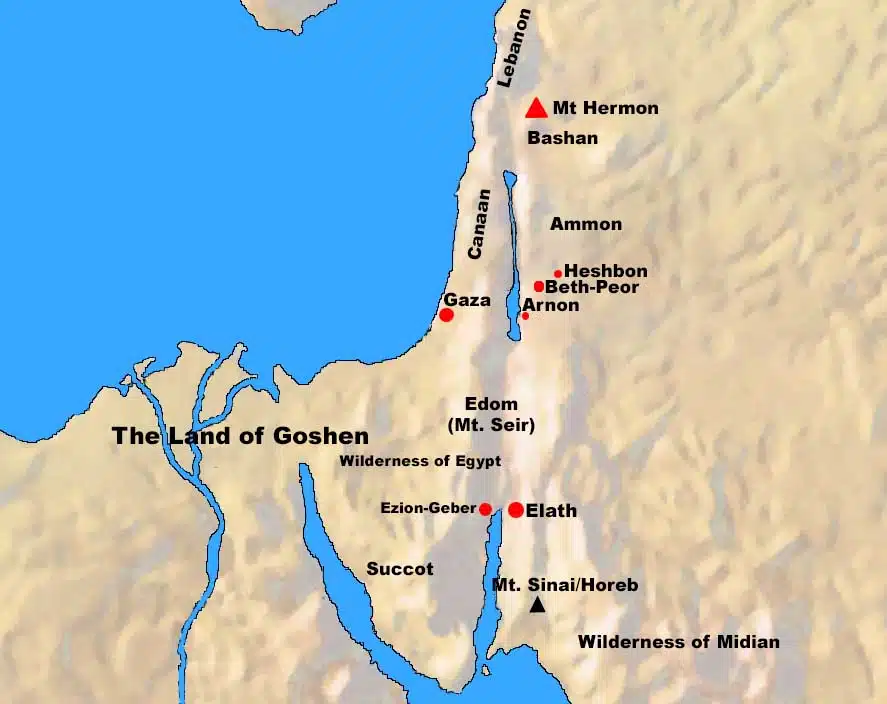The First Commandment
The LORD demands exclusive loyalty from the Israelites because He alone is God.
The LORD introduced the Decalogue with a strong statement: “I am the LORD your God who brought you out of the land of Egypt, out of the house of slavery.” The statement “I am the LORD your God” is a fulfillment of God’s promise to Israel when He said He would deliver them from their bondage in Egypt and would redeem them “with an outstretched arm” (Exodus 3:13-15; Ex: 6:6-7). Thus, this self-presentation of God established the basis on which He expected His people to accept His authority. Instead of serving Pharaoh, the Israelites are now obligated under the covenant to serve their Suzerain LORD, their God. It is important for God to establish and communicate clearly this covenant with Israel so they understand the “deal.” Both what is their obligation under the covenant and what are the consequences for both obedience as well as disobedience.
In verse seven, Moses restated the first commandment God gave to Israel on Mount Sinai: “You shall have no other gods before Me.”
The ancient Near Eastern world was polytheistic, that is, they believed in the worship of many gods. The idea behind this polytheistic view was that no one god possessed absolute power and wisdom; no one god possessed all knowledge. Various gods had influence over different aspects of life. Pagan people worshiped more than one god in order that their needs could be met in these different areas. The essence of paganism was humans seeking power over their surroundings by appeasing spiritual powers. The basic idea was that we know what is best for ourselves, so we seek spiritual powers in order to gain what we want. God’s concise statement here makes clear that God alone knows what is in our best interest. Israel was prohibited from seeking spiritual power to fuel their self-seeking.
It was amid this pagan, polytheistic context that the true God (Yahweh) revealed Himself to Moses and to the Israelites. The LORD alone redeemed the Israelites from bondage in Egypt because He is all-powerful (Exodus 6). For this reason, He asked the Israelites to refrain from seeking benefit from other gods by saying, “You shall have no other gods before Me.”
The pronoun “you” in the Hebrew text is singular, probably to emphasize that the Decalogue was directed to every individual Israelite. Even though the covenant is with the nation, each person was responsible to obey God’s laws. The nation is not just the leaders or the government; it is each person. God is setting up a foundation for self-governing political system for Israel, based on voluntary cooperation and people using their freedom to choose to seek mutual benefit. This will not be possible if each person seeks power from gods to get what they want, often at the expense of others. It will only work if individuals bow to God’s authority, and seek the welfare of others.
The phrase “before Me” means “in My presence.” This prohibits other deities from being considered as an authority or an alternative to the LORD. God’s statement prohibiting the worship of other gods is intended to acknowledge the LORD as the only true God because the other gods were merely idols who had no real power (Deuteronomy 32:21). Why then would it be prohibited, if they have no real power? Likely it is because by seeking power to do our bidding, each person is declaring their selfish desires as the highest moral good. This undermines the self-governing structure God desired Israel to put on display for other nations to see, to serve their function as a priestly nation.
Since the other deities were powerless and insignificant, the Suzerain (Ruler) God challenged His people to reject them because He alone redeemed His chosen vassals out of bondage. He had the right to demand exclusive loyalty from them.
When Jesus Christ was tempted by Satan, he quoted Deuteronomy 6:13: “You shall worship the LORD Your God and serve Him only” (Matthew 4:10). Moreover, when one of the scribes asked Jesus what the greatest commandment was, he [Jesus] quoted Deuteronomy 6:4: “Hear, O Israel! The LORD our God is one LORD” (Mark 12:29). The first commandment essentially provides a foundational acknowledgment of reality, that God is God, and we are not.
Biblical Text:
6 I am the Lord your God who brought you out of the land of Egypt, out of the house of slavery.
7 You shall have no other gods before Me.
Check out our other commentaries:
-
Deuteronomy 32:44-47 meaning
After reciting his song to the Israelites (vv. 1-43), Moses exhorts them to covenant faithfulness, calling them to take everything to heart to live long...... -
Hosea 9:15-17 meaning
The LORD states that Israel’s bad leaders and wicked behavior will cause her to be dried up like a tree whose growth depends on a...... -
Matthew 19:3-9 meaning
The Pharisees come to Jesus and test Him about what Moses said about divorce. They were trying to trap Him. Jesus begins His answer by...... -
Matthew 2:7-8 meaning
Herod intends to kill the child sought by the magi and end the threat to his rule. He treacherously summons the magi to determine precisely...... -
Deuteronomy 15:19-23 meaning
Moses commands the Israelites to set apart all the firstborn males of their domesticated animals to the Suzerain (Ruler) God.......




